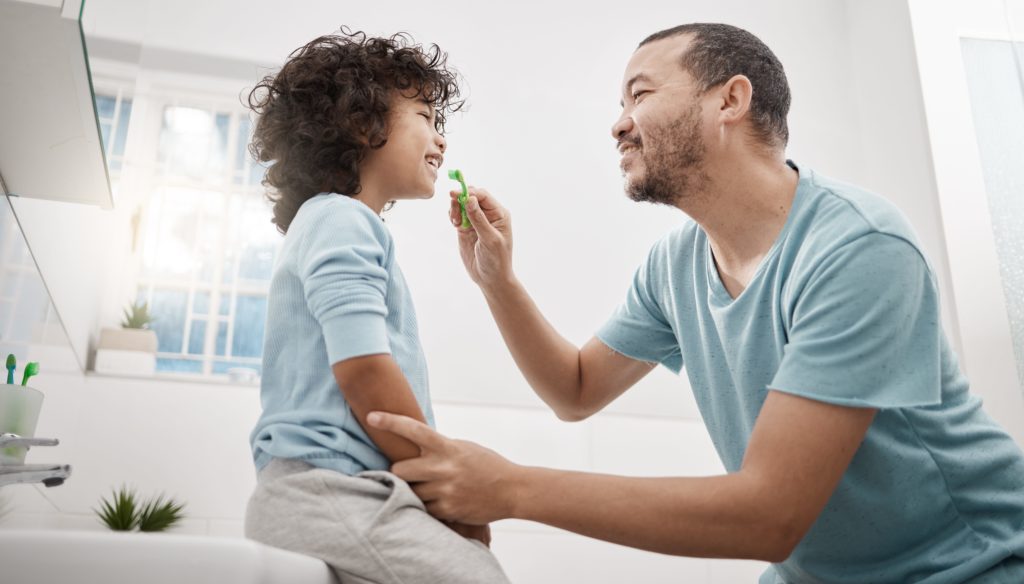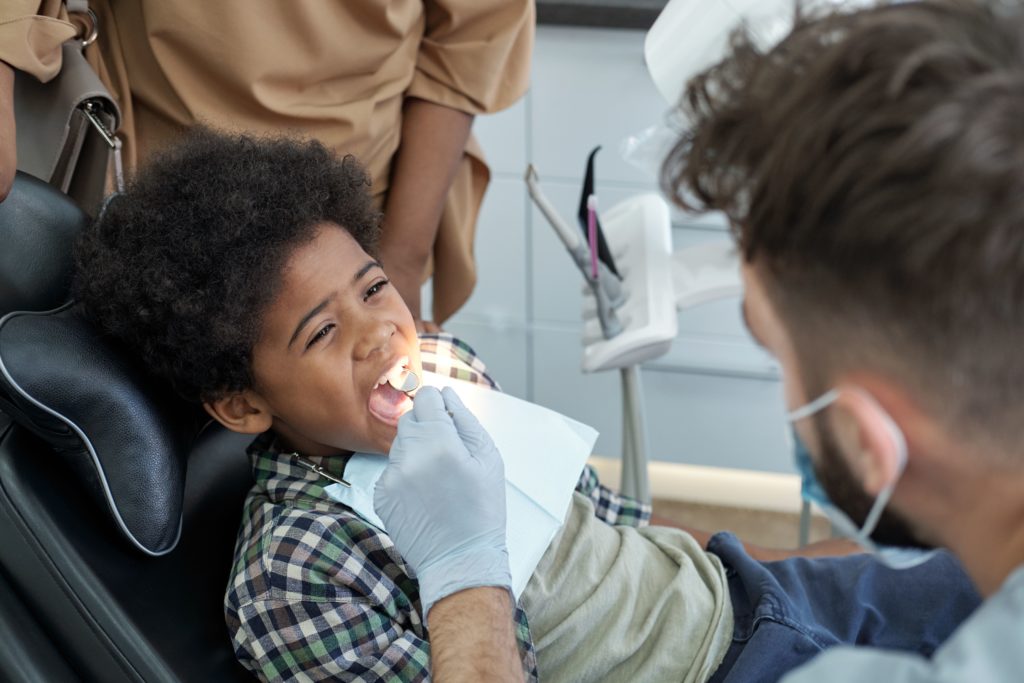Good oral hygiene habits established early in life are crucial for your child’s long-term dental health. According to alarming statistics, childhood dental problems can have lasting effects, impacting their overall well-being. In this blog post, we will guide you through essential practices to ensure your child’s oral health from an early age. From introducing oral hygiene routines to addressing dental fears, we’ll cover everything you need to know.
Start Early: Introducing Oral Hygiene to Your Child
It’s never too early to begin caring for your child’s oral health. The appropriate age to start oral care routines is as soon as their first tooth emerges, usually around six months of age. Before teeth erupt, you can gently clean your baby’s gums with a soft, damp cloth or a silicone finger brush. This helps remove bacteria and gets them accustomed to the sensation of oral care.
As your child’s teeth start to come in, it’s time to transition to using a toothbrush and toothpaste. Choose a soft-bristled toothbrush specifically designed for infants or toddlers. Use a tiny smear of fluoride toothpaste, about the size of a grain of rice, and brush their teeth twice a day. It’s important to supervise brushing until your child can effectively spit out toothpaste, usually around the age of three.
When selecting oral care products, opt for age-appropriate options. Look for toothbrushes with small heads and soft bristles that are gentle on your child’s delicate gums and tooth enamel. As for toothpaste, choose one that is specifically formulated for children and contains the appropriate amount of fluoride. Remember to replace toothbrushes every three to four months or sooner if the bristles become frayed.
Starting early with oral hygiene routines, using gentle techniques for cleaning gums, transitioning to a toothbrush and toothpaste, and selecting age-appropriate oral care products are essential steps in setting the foundation for your child’s oral health. By instilling these practices from an early age, you’ll help promote healthy teeth and gums while establishing a lifetime of good oral hygiene habits.
The Importance of Regular Dental Check-ups for Children
Scheduling regular dental check-ups is crucial for your child’s oral health and overall well-being. The first dental visit should occur within six months after the eruption of their first tooth, usually around the age of one. This early visit allows the dentist to monitor tooth development, assess oral hygiene practices, and provide guidance on proper care tailored to your child’s specific needs. It also helps your child become familiar with the dental environment and build a positive relationship with their dentist.
During a paediatric dental appointment, the dentist will conduct a comprehensive examination of your child’s teeth, gums, and mouth. They will check for any signs of tooth decay, gum disease, or other dental issues. Additionally, preventive measures such as fluoride treatments and dental sealants may be discussed. Fluoride treatments help strengthen tooth enamel and protect against cavities, while dental sealants provide a protective barrier on the chewing surfaces of the back teeth to prevent decay. These preventive treatments can significantly reduce the risk of dental problems and promote optimal oral health.
It’s natural for children to have concerns and fears about dental visits. Dentists are well aware of this and take extra steps to ensure a comfortable experience. They use child-friendly language, explain procedures beforehand, and create a welcoming and relaxing atmosphere. Addressing common concerns, such as fear of needles or dental instruments, helps alleviate anxiety. By regularly attending dental check-ups, you can address any concerns your child may have and reinforce the importance of maintaining good oral health, paving the way for a lifetime of healthy smiles.
Healthy Eating Habits for Your Child’s Oral Health
Diet plays a significant role in maintaining optimal oral health for children. The impact of diet on your child’s oral health is undeniable, as certain foods and drinks can contribute to tooth decay while others promote dental health. To promote strong teeth, it’s important to follow nutritional guidelines specifically designed for children’s dental health.
Aim to include a variety of nutritious foods in your child’s diet, such as fruits, vegetables, whole grains, lean proteins, and dairy products. These foods provide essential vitamins and minerals that support healthy teeth and gums. Encourage your child to drink plenty of water throughout the day, as it helps rinse away food particles and keeps the mouth hydrated.
Limiting or avoiding certain foods and drinks is crucial to prevent tooth decay. Sugary snacks and beverages, including candies, cookies, soda, and juice, can contribute to the formation of cavities. Limiting their consumption and encouraging your child to brush their teeth or rinse their mouth with water after consuming them can help minimise the risk.
When it comes to tooth-friendly snacks, there are plenty of options that are both nutritious and enjoyable. Consider offering your child crunchy fruits and vegetables like apples, carrots, and celery, which can help naturally clean their teeth and stimulate saliva production. Cheese, yoghurt, and nuts are also excellent choices as they provide calcium and proteins that promote strong teeth. Remember to encourage regular brushing and flossing after meals and snacks to maintain your child’s oral health at a high level.
By being mindful of your child’s diet and promoting healthy eating habits, you can significantly contribute to their dental health. Following the recommended nutritional guidelines, limiting sugary foods and drinks, and incorporating tooth-friendly snacks into their diet will support strong teeth and help prevent tooth decay, setting the stage for a lifetime of healthy smiles.
Setting a Positive Example and Encouraging Independence
Parents play a crucial role in shaping their child’s oral health habits. Children often emulate their parents’ behaviour, making it essential to set a positive example. Demonstrating your own commitment to oral hygiene by brushing and flossing regularly sends a powerful message to your child about the importance of taking care of their teeth. Let them observe your brushing techniques and encourage them to join you in the bathroom for a family oral care routine. This not only establishes a sense of togetherness but also reinforces the importance of oral hygiene as a shared family value.
While it’s important to guide your child’s oral care routine, promoting independence and self-care skills is equally vital. As they grow older, encourage them to take responsibility for their own oral health. Provide age-appropriate toothbrushes, toothpaste, and floss, and teach them proper techniques. Gradually let them take the lead in brushing and flossing their own teeth, while still offering guidance and supervision. This helps foster their sense of ownership over their oral health and boosts their confidence in maintaining good hygiene habits independently.
Rewards and positive reinforcement can be powerful motivators in cultivating good oral hygiene practices. Offer praise and recognition when your child consistently brushes their teeth or demonstrates other positive oral care habits. Consider implementing a reward system, such as a sticker chart or small incentives, to celebrate milestones or achievements. By associating oral hygiene with positive experiences, you can instil a sense of pride and encourage your child to continue prioritising their dental health.
Establishing good oral hygiene habits from an early age sets the foundation for a lifetime of healthy smiles. By following the guidance provided in this blog post, you can ensure your child’s oral health remains a top priority. Remember, the long-term benefits of focusing on your child’s oral health care from an early age are invaluable. Take proactive steps to safeguard your child’s dental well-being and don’t hesitate to reach out if you have any questions or experiences to share. Together, let’s create a generation of bright, healthy smiles!



